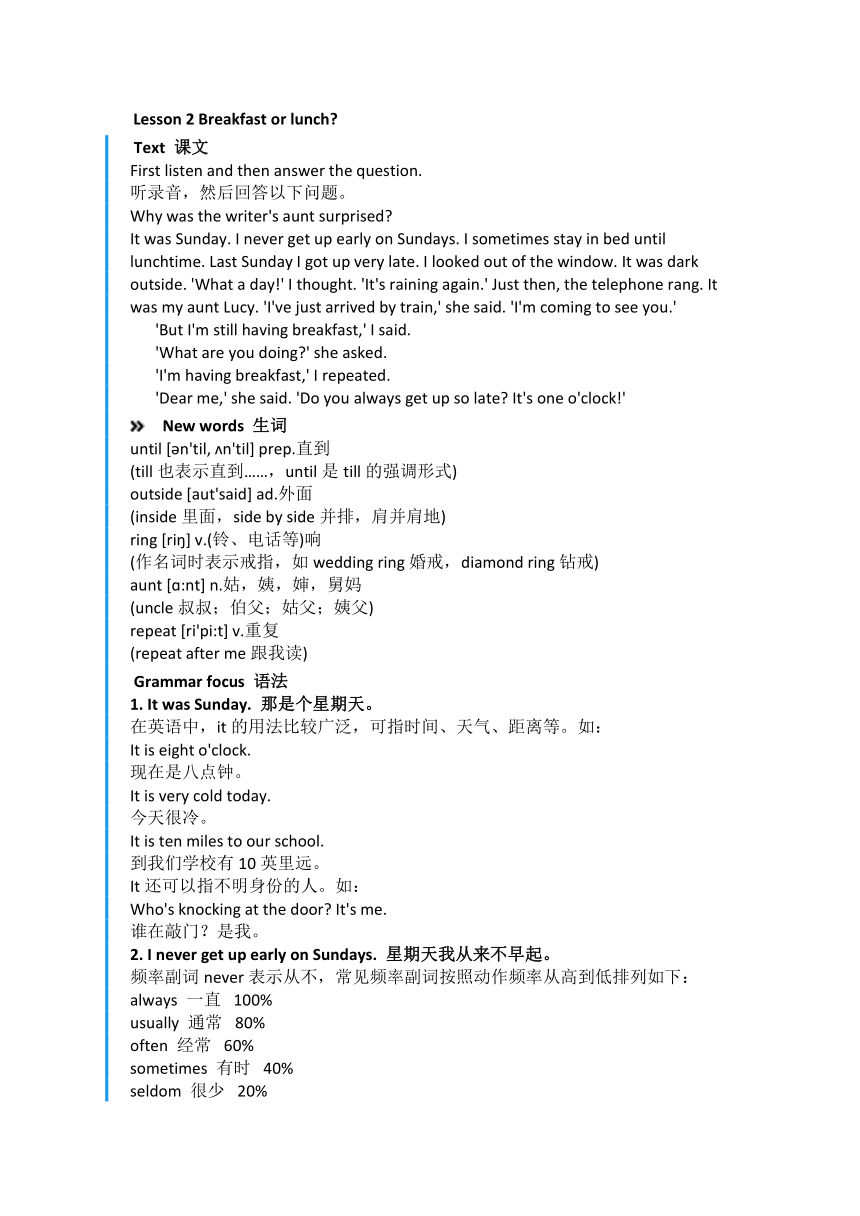
Lesson 2 Breakfast or lunch Text 课文 First listen and then answer the question. 听录音,然后回答以下问题。 Why was the writer's aunt surprised It was Sunday. I never get up early on Sundays. I sometimes stay in bed until lunchtime. Last Sunday I got up very late. I looked out of the window. It was dark outside. 'What a day!' I thought. 'It's raining again.' Just then, the telephone rang. It was my aunt Lucy. 'I've just arrived by train,' she said. 'I'm coming to see you.' 'But I'm still having breakfast,' I said. 'What are you doing ' she asked. 'I'm having breakfast,' I repeated. 'Dear me,' she said. 'Do you always get up so late It's one o'clock!' New words 生词 until [ n'til, n'til] prep.直到 (till也表示直到……,until是till的强调形式) outside [aut'said] ad.外面 (inside里面,side by side并排,肩并肩地) ring [ri ] v.(铃、电话等)响 (作名词时表示戒指,如wedding ring婚戒,diamond ring钻戒) aunt [ɑ:nt] n.姑,姨,婶,舅妈 (uncle叔叔;伯父;姑父;姨父) repeat [ri'pi:t] v.重复 (repeat after me跟我读) Grammar focus 语法 1. It was Sunday. 那是个星期天。 在英语中,it的用法比较广泛,可指时间、天气、距离等。如: It is eight o'clock. 现在是八点钟。 It is very cold today. 今天很冷。 It is ten miles to our school. 到我们学校有10英里远。 It还可以指不明身份的人。如: Who's knocking at the door It's me. 谁在敲门?是我。 2. I never get up early on Sundays. 星期天我从来不早起。 频率副词never表示从不,常见频率副词按照动作频率从高到低排列如下: always 一直 100% usually 通常 80% often 经常 60% sometimes 有时 40% seldom 很少 20% never 从不 0% 频率副词通常放在实义动词之前,如下文中的句子: I sometimes stay in bed until lunchtime. 有时我要一直躺到吃午饭的时候。 sundays是复数,表示这是一个经常性的行为,每一个周日都是这样。 3. I looked out of the window. 我望望窗外。 look out of…向……外看。和look相关的词组还有: look into sth. 调查某事。如: We have to look into the accident. 我们必须对这次事故作调查。 look over sth. 仔细检查。如: I think you should look over these figures again. 我想你应该再把这些数字核实一遍。 look up 查找。如: Look up the dictionary if you meet some new words. 如果你遇到不认识的单词,请查字典。 4. What a day!鬼天气! 这句话是一个省略的感叹句,完整的句子应该是:What a day it is! 这句话也省略了形容词,根据上下文,我们知道这是一句抱怨的话,所以翻译为鬼天气。当然肯定意义的感叹句What a beautiful day it is. 也可以省略为What a day. 这时则表示多么美好的一天啊!由What引导的感叹句,其句子结构为:What+a/an+形容词+名词+主语+谓语(主语和谓语通常被省略)。如: What a beautiful garden (it is)! 多美的花园啊! What a handsome boy (he is)! 多么英俊的男孩啊! 由how引导的感叹句,其句子结构为:How+形容词+(a/an)+主语+谓语(在上下文中,主语和谓语也可以省略)。what引导的感叹句,也可以改写为由how引导的感叹句。如: How beautiful a garden (it is). How handsome a boy (he is). 这两个感叹句也可以表达为: How beautiful (the garden is). How handsome (the boy is)! 5. I'm coming to see you. 我这就来看你。 本句是用现在进行时表示即将发生的动作。 现在进行时的结构为:be+doing. 通常 ... ...
~~ 您好,已阅读到文档的结尾了 ~~